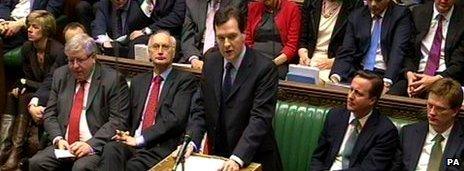Budget 2012: Osborne sticks to plan A
- Published

George Osborne's big picture is that green shoots are emerging in the UK economy - a few, tiny buds - but the deficit reduction plan will be gradual and long drawn out.
The government is sticking to plan A, as defined by the first coalition Budget in June 2010.
The chancellor confirmed what had already been conceded in recent months, it will last until 2017, two years past the initial estimate.
So this government's third Budget is fiscally neutral - where the chancellor has cut taxes he has had to increase them elsewhere.
Low earners will pay less tax, so will high earners. There's cost savings from withdrawing UK forces from Afghanistan in 2013 and 2014. Smokers get hit hard. There's an increase on tax for the very wealthy who are selling their property, and a blunt warning about tax avoidance on property.
Most surprisingly there was an effective tax rise for pensioners, who will see their personal allowance frozen then abolished.
That was proof that he has to balance the books. Where some gained others had to lose. The most eye catching element - the cut in top rate next year from 50% to 45% - was justified by independent research on how much more revenue it could bring in for the government.
This was the most politically toxic part of the Budget and George Osborne made sure it was presented as a sensible thing to do. Labour have long labelled it "the wrong priority".
Ed Miliband's attack focused on the top rate cut - a bankers' bonus he labelled it.
Then in an effective bit of parliamentary theatre he urged cabinet members on the front bench to hold up their hands if they would benefit from the move to 45%.
This was "the millionaires' budget" he told MPs. The message from the chancellor was clear, right from the very outset; "this budget rewards work", it "unashamedly backs business" he said.
You could have been forgiven for forgetting this is a coalition government, not a Conservative government.
But he did give the Liberal Democrats what they had so publicly pushed for on personal allowances.
He will go "further and faster" in increasing the amount people can earn before they start paying tax. The Liberal Democrats will claim a key victory.
At the same time there was a concession to worried Tories who claimed moves to cut child benefit for higher rate payers would hit many working families, and prove politically damaging.
The cut will come, but more gradually and the starting threshold has been increased.
The government is sticking to the plan but tucked away in the middle of the Budget speech was proof of how hard that plan will be to see through.
The Office for Budget Responsibility predicts that there will have to be a further £10bn of savings from the welfare spend in the next spending review.
That is on top of the £18bn Iain Duncan Smith has had to find already. And don't forget that the bulk of the cuts first unveiled by the government have yet to bite.